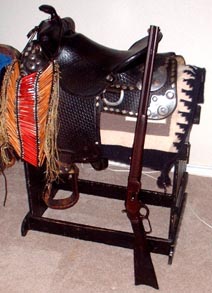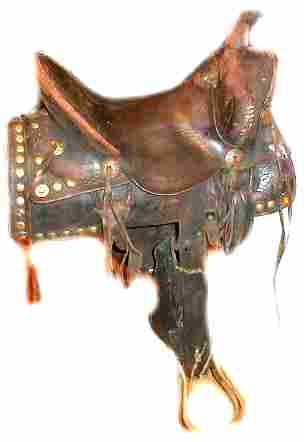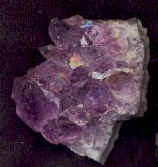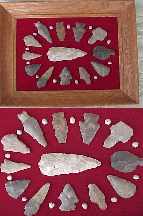   
THE DUAL TREATIES OF VELASCO (May 14, 1836)

Although the Texas Army scored a stunning defeat against Santa Anna's army at the battle of San Jacinto after the fall of the Alamo and Goliad, the Texians were still a long way from being free of the rule of Mexico.
There were still thousands of Mexican troops in the Texas territory that had not taken part in the San Jacinto Battle and the end of war between Texas and Mexico were far from over. This was precisely the reason that General Sam Houston prevented Santa Anna from being executed at San Jacinto although the Texas soldiers were calling for revenge for his attrocities at the Alamo and Goliad. A live General Santa Anna was needed to negotiate a settlement to the war.
A few weeks after the battle of San Jacinto, the acting President of the Republic of Texas, David G. Burnet, had treaty papers drawn up at the Port of Velasco on May 14, 1836 for General Santa Anna to sign.
There were two treaties of Velasco, one designated a public treaty and one a private treaty. The public treaty was to be published immediately after it was signed.
A second "secret" treaty was to be implemented after the terms of the public treaty were fulfilled. The secret treaty provided for Santa Anna's immediate release in exchange for his recognition of Texas as an independent nation.
Unfortunately, the terms of the two treaties of Velasco were violated by both parties. Consequently, the Texas army blocked Santa Anna's release and the Mexican government declared null and void all of Santa Anna's acts while in captivity.
Together, the treaties somewhat loosely established Texas' southern border at the Rio Grande River, but this issue was not resolved until 1848 with the signing of the Treaty of Guadalupe Hidalgo which ended the Mexican-American War. At this time, Texas was no longer a republic but a state of the United States.
The Public Treaty of Velasco
The The Public Treaty of Velasco consisted of ten articles including the following:
1st Article- General Antonio Lopez de Santa Anna agrees that he will not take up arms, nor will he exercise his influence to cause them to be taken up against the people of Texas, during the present war of Independence
2nd Article- All hostilities between the mexican and texian troops will cease immediately both on land and water.
3rd Article-The mexican troops will evacuate the Territory of Texas, passing to the other side of the Rio Grande del Norte.
4th Article- The mexican Army in its retreat shall not take the property of any person without his consent and just indemnification, using only such articles as may be necessary for its subsistence, in cases when the owner may not be present, and remitting to the commander of the army of Texas or to the commissioner to be appointed for the adjustment of such matters, an account of the value of the property consumed--the place where taken, and the name of the owner, if it can be ascertained.
5th Article-That all private property including cattle, horses, negro slaves or indentured persons of whatever denomination, that may have been captured by any portion of the mexican army or may have taken refuge in the said army since the commencement of the late invasion, shall be restored to the Commander of the Texian army, or to such other persons as may be appointed by the Government of Texas to receive them.
6th Article- The troops of both armies will refrain from coming into contact with each other, and to this end the Commander of the army of Texas will be careful not to approach within a shorter distance of the mexican army than five leagues (approximately 25 km).
7th Article-The mexican army shall not make any other delay on its march, than that which is necessary to take up their hospitals, baggage and to cross the rivers--any delay not necessary to these purposes to be considered an infraction of this agreement.
8th Article- By express to be immediately dispatched, this agreement shall be sent to General Filisola and to General T. J. Rusk, commander of the texian Army, in order that they may be apprised of its stipulations, and to this and they will exchange engagements to comply with the same.
9th Article- That all texian prisoners now in possession of the mexican Army or its authorities be forthwith released and furnished with free passports to return to their homes, in consideration of which a corresponding number of Mexican prisoners, rank and file, now in possession of the Government of Texas shall be immediately released. The remainder of the mexican prisoners that continue in possession of the Government of Texas to be treated with due humanity -- any extraordinary comforts that may be furnished them to be at the charge of the Government of Mexico.
10th Article- General Antonio Lopez de Santa Anna will be sent to Veracruz as soon as it shall be deemed proper.
The Secret Treaty of Velasco
The Secret Treaty of Velasco was not to be made public until the terms of the public treaty had been met in full. The terms of the secret treaty included:
Personal undertaking by Santa Anna not to take up arms, or encourage arms to be taken up, against the people of Texas in this war of independence.
Santa Anna to give orders for all Mexican troops to withdraw from Texas as soon as possible.
Santa Anna to make arrangements in Mexico City so that a mission of Texans would be well received, all differences settled, and independence recognized.
A treaty of commerce, friendship, and limits to be established between Mexico and Texas, whereunder the territory of Texas would not extend beyond the Rio Grande.
Government of Texas to provide for Santa Anna's immediate embarkation for Veracruz.
Both the Public and the Secret copies of the treaties were to be kept folded and sealed until conclusion of the negotiations, when they would both be given to Santa Anna.
Noncompliance by Mexico
Although General Vicente Filisola of the Mexican army began troop withdrawals on May 26, 1836, the government of President Jos� Justo Corro in Mexico City resolved a week earlier to disassociate itself from all undertakings entered into by Santa Anna while he was held captive. Mexico's position was that Santa Anna had no legal standing to agree to those terms. Santa Anna's position (or at least what he claimed later, back in Mexico) was that he had signed the documents under coercion and as a prisoner, not as a surrendering general in accordance with the laws of warfare. In fact, he had no authority under the Mexican Constitution to make a treaty, and in any case, the treaty was never ratified by the Mexican government.
Noncompliance by Texas
Santa Anna was kept as a prisoner of war in Velasco and, later, in Orizimbo, before being taken to Washington, D.C., in the United States to meet with President Andrew Jackson (to negotiate a lasting peace between Mexico and Texas, with the US acting as mediator). Sailing on the frigate USS Pioneer, General Santa Anna did not arrive back in Veracruz until 1837.
Mexican Invasion of 1842
With the failed Treaties of Velasco, the new Republic of Texas was in constant fear of a Mexican invasion. Mexico refused to accepth the independence of the Texans and sent troops to invade the Republic in 1842.
(SEE
The Mexican Invasion of 1842

BIBLIOGRAPHY:
Archie P. McDonald, Travis (Austin: Jenkins, 1976). William Barret Travis, Diary, ed. Robert E. Davis (Waco: Texian Press, 1966). Amelia W. Williams, A Critical Study of the Siege of the Alamo and of the Personnel of Its Defenders (Ph.D. dissertation, University of Texas, 1931; rpt., Southwestern Historical Quarterly 36 [April 1933], 37 [July, October 1933, January, April 1934).
 For questions or comments, send me an Email For questions or comments, send me an Email
|





 For questions or comments, send me an Email at lenkubiak.geo@yahoo.com
For questions or comments, send me an Email at lenkubiak.geo@yahoo.com

 Return to the Fort Tumbleweed Home Page
Return to the Fort Tumbleweed Home Page





















